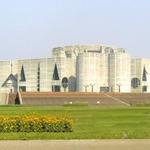Democratic Renewal in Bangladesh
<div class="event-icon"></div> <span>Save this event in my Outlook calendar</span>
<div class="event-icon"></div> <span>Save this event in my Google Calendar</span>
The December 2008 parliamentary elections once again gave Bangladesh opportunities for a democratic renewal. The two years (2007-2008) of a military- backed civilian "caretaker" government has underscored the fragility of democracy in Bangladesh. What steps are the new government of Sheikh Hasina, who won the 2008 elections on the promise of Din Bodol (charter of change), taking to fulfill her electoral pledge of bringing a qualitative change in politics and governance to strengthen the foundations of democracy in Bangladesh?
The presentation will provide a brief overview of the history of Bangladesh, analyze the major threats to democracy, underscore the problems of addressing these threats and highlight the dilemmas faced by the new government as it begins to tackle some of the long standing challenges of democratic consolidation.
The overarching challenge of "democratizing democracy" will be discussed at length which will include the issues of politics of exclusion and violence; politicization and partisanization of state institutions; criminalization of party and electoral politics; centralization of power; corruption; and weakness of accountability institutions.
Professor Rounaq Jahan is a Distinguished Fellow at the Centre for Policy Dialogue, Dhaka, Bangladesh and former professor at the University of Columbia.
Projects

Bangladesh: Inclusive growth and good governance

The Parliament of Bangladesh: Representation and Accountability

